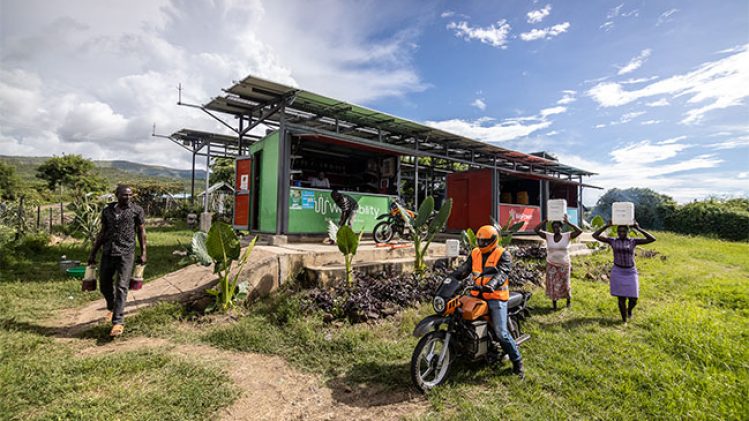Creative, Concrete, Dynamic and Transformative:
WeTu’s cross-sectoral approach
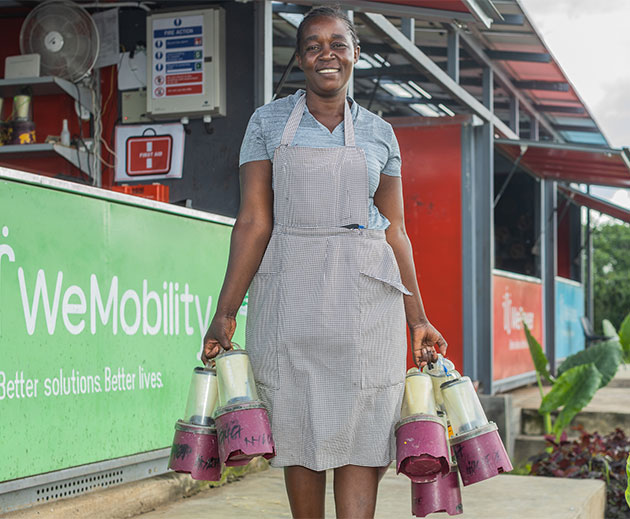
What do fishing lamps have to do with motorcycles? And what role do clean drinking water, ice, and recycled electronic devices play in the mix? Let me take you to an immersive journey to Kisumu, the third largest city in Kenya, and from there to Mbita via Homa by, along Lake Victoria.
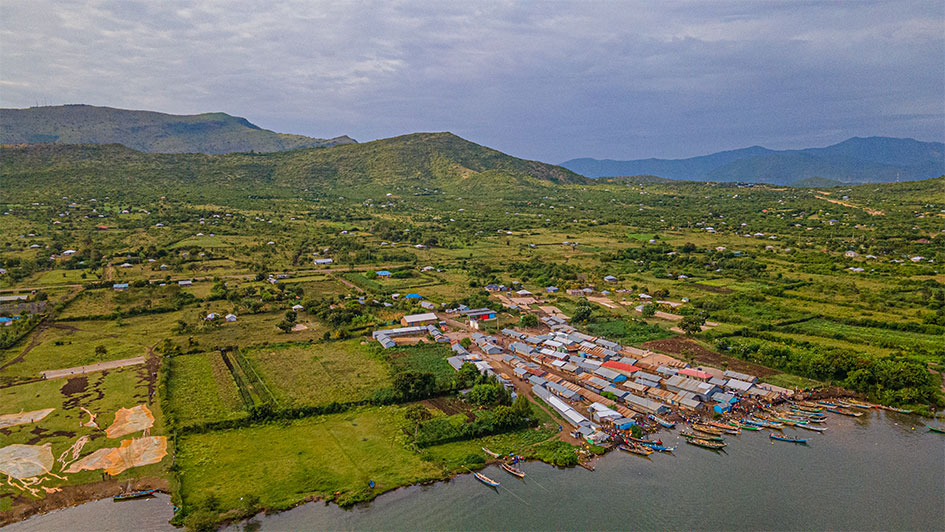
On this route, you’ll find various “Innovation Hubs” run by the social enterprise WeTu, which means “Ours” in Swahili. Here, you can see how WeTu’s somewhat abstract-sounding cross-sectoral approach is put into practice on the ground. Founded in 2019 by the Siemens Stiftung (foundation) as the main investor, the company links the areas of safe drinking water, solar power, e-mobility, and recycling, thus providing sustainable and affordable solutions for the local population. WeTu’s motto is “Transformative impact before profit” and it aims to improve the lives of people in and around the fishing communities for the long-term. In addition to Kisumu County, the social enterprise also operates in the counties of Homa Bay, Migori, and Siaya in western Kenya.
E-mobility for rural areas
We stop, among other places, at the largest Innovation Hub in Homa Bay: On a site near the main road, a bit outside the center, stands a collection of colorful containers. There is a busy yet friendly and relaxed atmosphere. Here, as in other WeTu hubs, you’ll meet a team of mostly young, well-educated men and women, whose commitment and enjoyment of their work is evident. Joel Mwando, responsible for monitoring and evaluation, especially enjoys showing visitors around – starting with the biker garage.
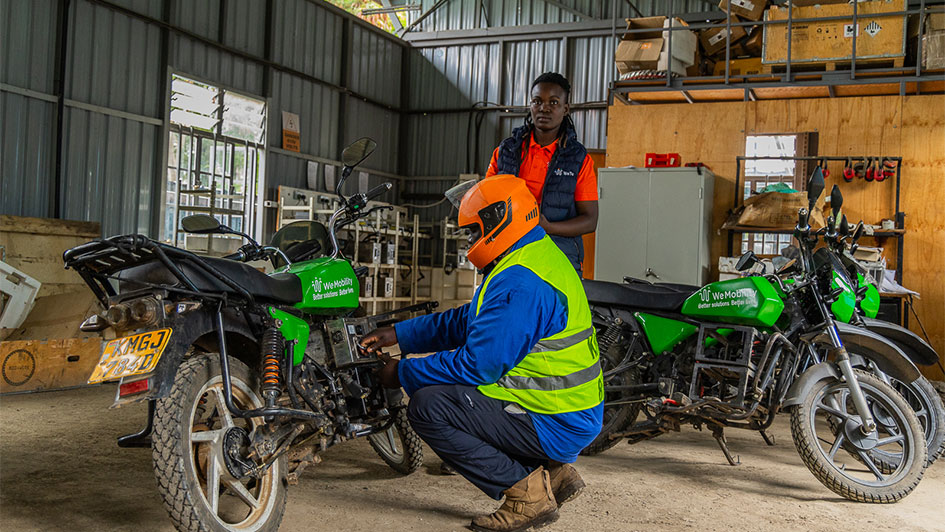
There they are: Bright green electric motorcycles – mainly robust Bajaj Boxer models from India, popular throughout Africa. For 1,000 Kenyan Shillings (about 8 euros) per month, locally licensed “Boda-Boda Drivers” (as motorcycle taxi drivers are popularly called) can lease the vehicles from WeTu. A “swap fee” of 250-300 Kenyan Shillings is charged for the batteries, depending on the model and range. Maintenance and recharging of the specially adapted batteries, or the Gogo models from Uganda, are included in the price.
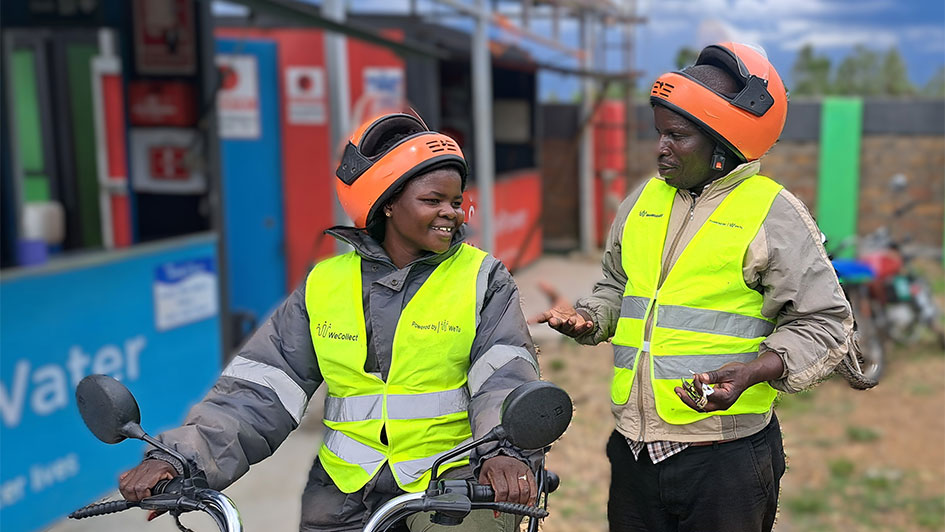
For Junice Akoth, 34, and Kennedy Bolo, 44, who both rent their bikes at the nearby WeTu station in Katito, this is a worthwhile business model. “I save on the ever-increasing fuel costs. It also saves CO₂ emissions and is climate and environmentally friendly,” says Bolo. According to rider Akoth, the e-motorbikes are also popular with passengers: “They appreciate that the vehicles don’t make a loud noise.” A woman like Akoth at the handlebars of a Boda-Boda is still rare in Kenya – but WeTu wants to change that too. Training is offered for women to become drivers or mechanics. a recent workshop for 30 young women, held together with the UN Environment Program and the “Women on Wheels” initiative.
E-waste with added value
E-mobility is a striking, but by no means the only important component at WeTu. This becomes clear on a further tour of the Homa Bay hub. Directly next to the motorcycle garage is “WeCollect,” the recycling unit. Here, electronic waste (used laptops, TVs, refrigerators, and much more) is collected and either prepared for recycling or repaired by specialist Fredrik Ouko. According to his colleague Lavender Achieng, 50 Kenyan Shillings are paid for 1 kilo of electronic waste, while plastic is worth 20 Shillings per kilo.

“It’s mainly about raising awareness that discarded electronic devices lying around houses or dumped in the lake are a major hazard to health and the environment,” says Achieng. Now, WeTu does not make a profit from this component.

Fishing lamps with solar power
The business case, and at the same time the heart of the company, which cross-finances other components, can be found in another container. Since early morning, hundreds of orange and light blue portable lamps are connected to solar-powered charging stations. In the afternoon, the lamps, bearing the names of boats, are picked up by their owners, local fishermen. In the evening, they head out for night fishing on the lake – the lamps attract insects, which in turn attract “Omena,” the freshwater sardines that are a key source of income for people in this region. In the past, fishermen often used kerosene or acid-battery lamps. The solar lamps, also rented out by WeTu, now provide an environmentally friendly alternative for the already heavily polluted lake.
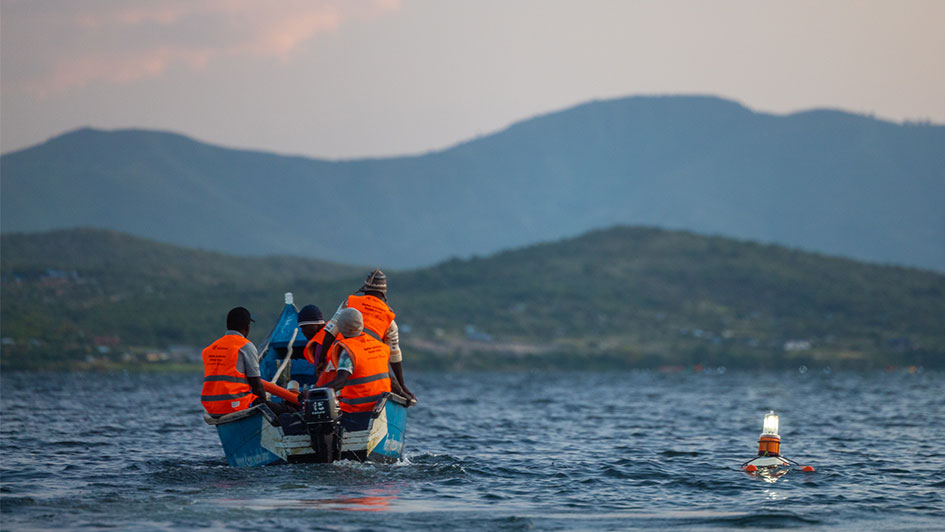
Solar is the core of the entire energy supply at the Homa Bay hub and other nearby stations, all similarly designed. Solar energy powers pumps and water purifiers – a prerequisite for another key area of WeTu: Providing the local population with clean drinking water – something the polluted lake cannot offer. At small ATM stations in the communities, water can be dispensed using prepaid cards that are digitally recharged. Water quality is regularly checked in WeTu’s own laboratories.

Smart service network
Lemeeh Tarwish oversees this complex system. “In the past, it was often about providing people with energy. We, on the other hand, offer them services based on clean energy.” Tarwish calls it “smart grid instead of mini grid.” The Homa Bay station alone consumes 200 kW per hour per day – equivalent to the consumption of around 150 two- to three-person households. “But we are technically well equipped for this,” says Tarwish. Clean ice for fishermen, small cooling huts for local markets – at WeTu, ideas for further services that can be integrated into this “smart network” never run out. But is all this profitable at such low prices? “We want to reach operational break-even by next year at the latest,” says Tilmann Straub, founder and managing director of WeTu. But for growth and innovation, “philanthropic money” from investors will still be needed in the future. And constant further development is WeTu’s trademark. Digital solutions play a major role. Straub: “Everything is now completely cashless with us.” WeTu also creates jobs in the region: currently 80 direct positions, a third of which are held by women.
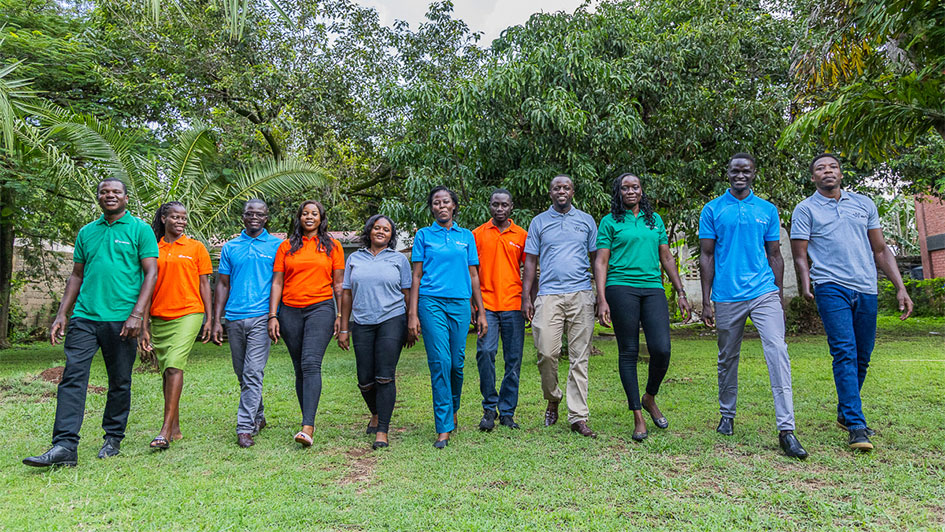
Social entrepreneurship approach
Can social entrepreneurship replace traditional development cooperation? “That would be too simplistic,” says Tilmann Straub, founder and managing director of WeTu. “In technology-driven fields such as energy or water, social entrepreneurial models can have a major impact – they enable solutions that are sustainable and scalable. In areas such as education, this is more challenging – but here, too, the first viable approaches are emerging.”
For Nina Smidt, member of the Executive Board of the Siemens Stiftung and shareholder of WeTu, the key lies not in either/or, but in interaction: “Impact is created when different sectors think and act together. Social entrepreneurship is an essential lever, especially in combination with public funding and local engagement. The Siemens Stiftung sees itself as a catalyst and bridge builder – between entrepreneurial innovation, systemic development work and the needs of local people.”
Learn more
about WeTu, the innovation hub with sustainable impact on Lake Victoria.
Find out more
